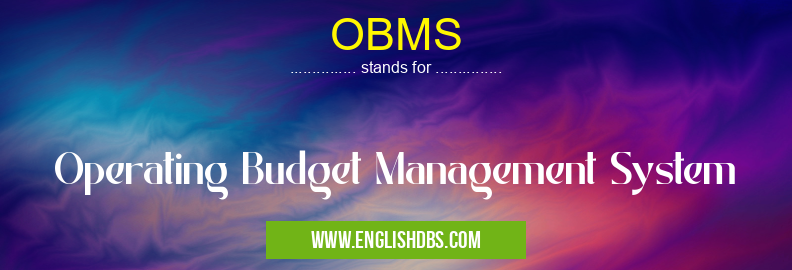What does OBMS mean in MANAGEMENT
OBMS stands for Operating Budget Management System. It is a software application that helps organizations manage their operating budgets. OBMS can be used to track income and expenses, create budgets, and forecast financial performance.

OBMS meaning in Management in Business
OBMS mostly used in an acronym Management in Category Business that means Operating Budget Management System
Shorthand: OBMS,
Full Form: Operating Budget Management System
For more information of "Operating Budget Management System", see the section below.
» Business » Management
Key Features of OBMS
- Budgeting: OBMS allows users to create and manage budgets for different departments, projects, or activities. Budgets can be based on historical data, assumptions, or a combination of both.
- Tracking: OBMS can track actual income and expenses against budgeted amounts. This allows users to identify variances and take corrective action as needed.
- Forecasting: OBMS can be used to forecast future financial performance based on historical data and current trends. This information can be used to make informed decisions about resource allocation and budgeting.
- Reporting: OBMS can generate a variety of reports that provide insights into financial performance. These reports can be used to track progress towards goals, identify trends, and make informed decisions.
Benefits of Using OBMS
- Improved financial visibility: OBMS provides organizations with a clear picture of their financial performance. This information can be used to make better decisions about resource allocation and budgeting.
- Increased accuracy: OBMS automates many of the tasks associated with budget management, which reduces the risk of errors.
- Time savings: OBMS can save organizations a significant amount of time by automating many of the tasks associated with budget management. This time can be used to focus on other important activities.
- Improved collaboration: OBMS can facilitate collaboration between different departments and teams within an organization. This can lead to better decision-making and improved financial performance.
Essential Questions and Answers on Operating Budget Management System in "BUSINESS»MANAGEMENT"
What is an Operating Budget Management System (OBMS)?
An OBMS is a software system designed to assist organizations in creating, managing, and tracking their operating budgets. It provides a centralized platform for budget planning, allocation, monitoring, and reporting, helping organizations improve financial planning and control.
What are the benefits of using an OBMS?
Using an OBMS can provide several benefits, including:
- Improved budget accuracy and transparency
- Enhanced budget collaboration and communication
- Streamlined budget approval processes
- Real-time budget monitoring and reporting
- Increased financial control and accountability
What types of organizations can benefit from using an OBMS?
OBMSs are suitable for organizations of all sizes and industries, including:
- Government agencies
- Educational institutions
- Non-profit organizations
- Healthcare providers
- Private businesses
How do I choose the right OBMS for my organization?
When selecting an OBMS, consider factors such as:
- Size and complexity of your organization
- Your budget and resource constraints
- Desired features and functionality
- Integration capabilities with existing systems
What are some best practices for using an OBMS?
Best practices for using an OBMS include:
- Establishing clear budget guidelines
- Involving all relevant stakeholders in the budget process
- Regularly monitoring and adjusting the budget as needed
- Using the OBMS to generate comprehensive budget reports
- Conducting regular OBMS reviews and evaluations
Final Words: OBMS is a valuable tool for organizations of all sizes. It can help organizations manage their operating budgets more effectively, improve financial visibility, and make better decisions.
